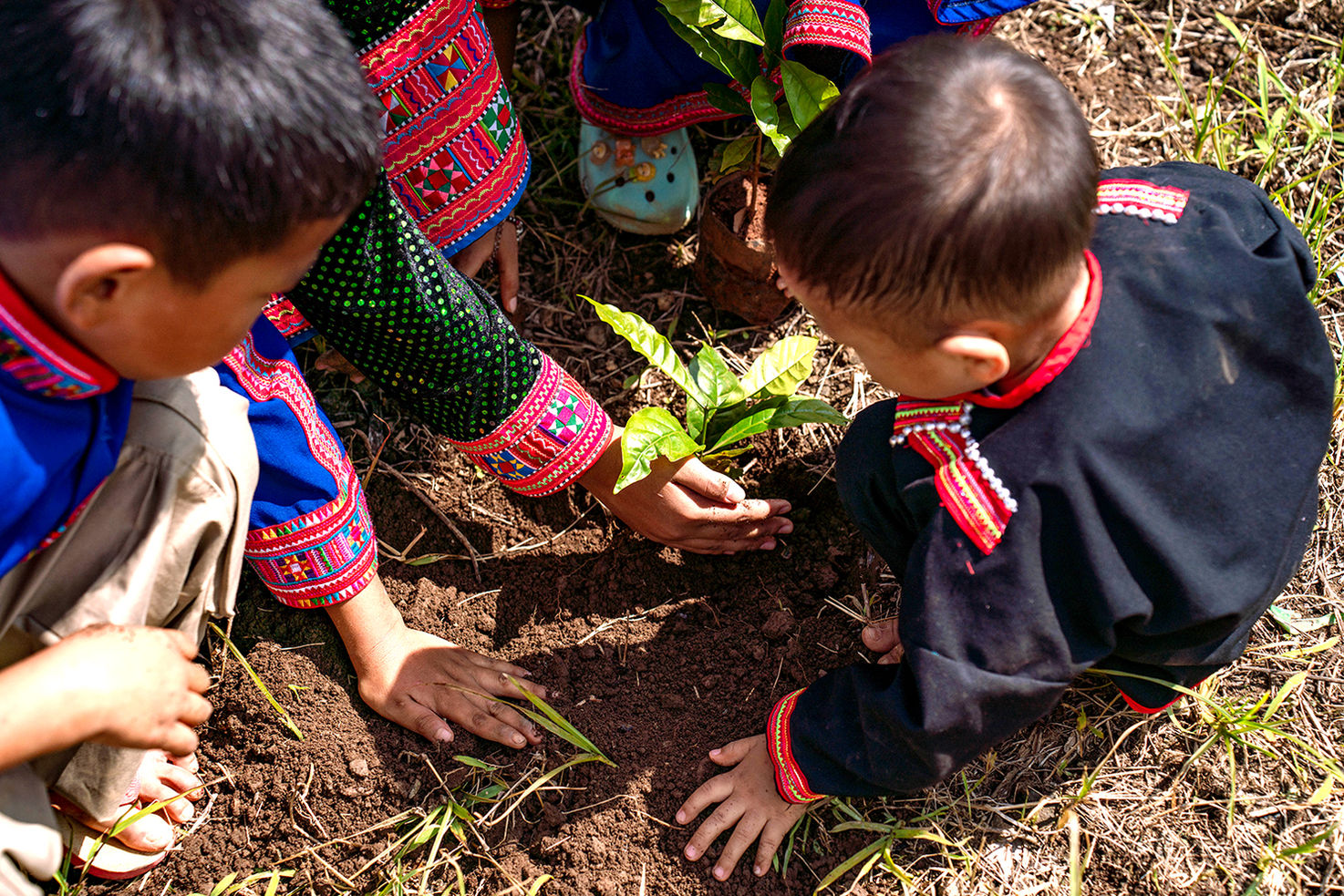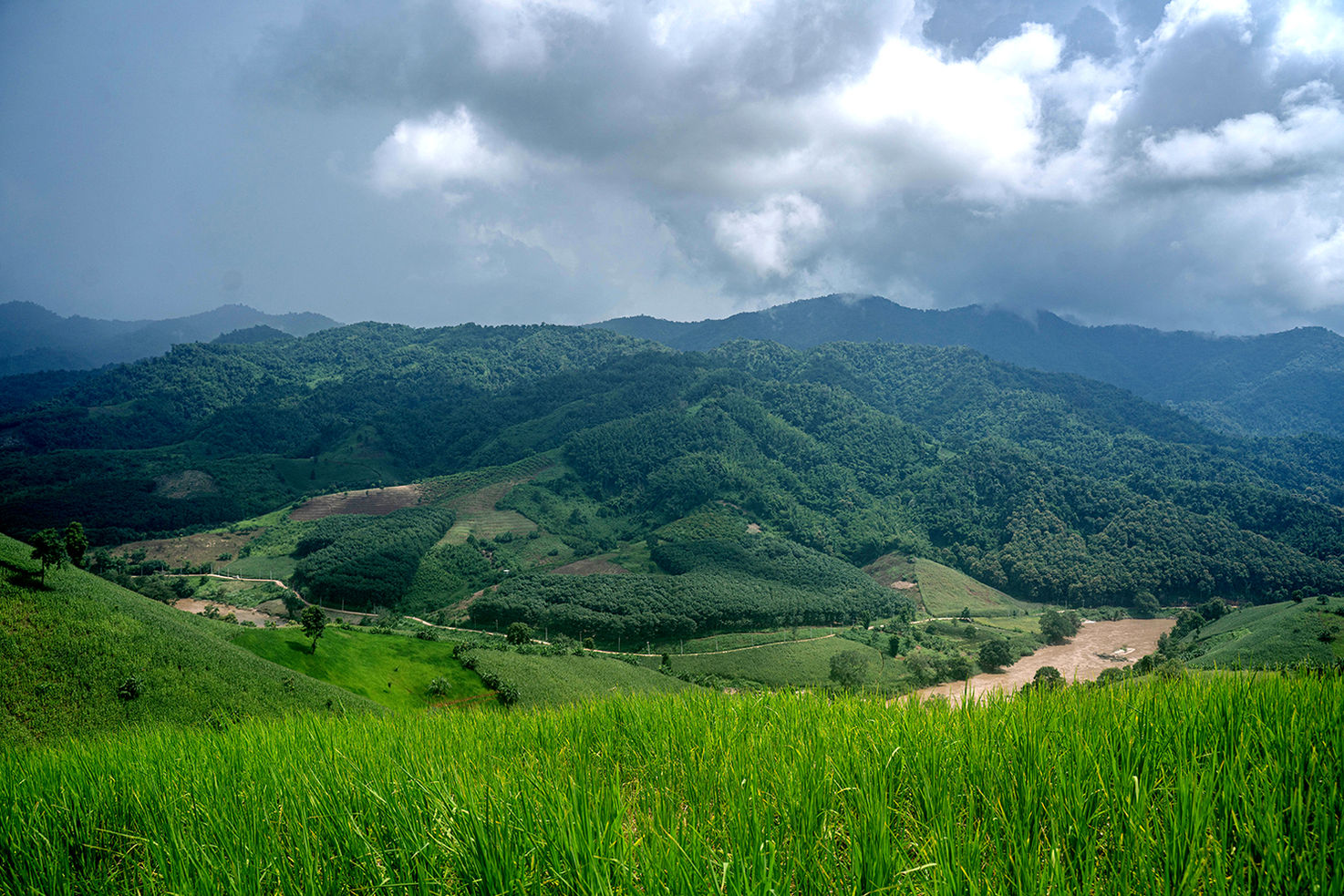

THE CHALLENGE
From Unsustainable Farming
to a Sustainable Future
CAFE LAHU seeks to preserve the value of the ancient Lahu culture, in connection with nature, to achieve a positive environmental impact and provide a better future for children and young people, with women as leaders of change. The Lahu community of Kanglaung, located in the mountainous north of Thailand near the Myanmar border, has traditionally relied on subsistence farming and the cultivation of maize. Over recent decades, the introduction of large-scale monocrop corn plantations— driven by external market demand—has brought severe environmental and social consequences. Corn monocrop exhausts the soil, causes erosion, and requires significant chemical inputs. These chemicals leach into streams and rivers, contaminating water sources and impacting both human health and local biodiversity. Once-forested slopes are now bare, vulnerable to landslides during the rainy season and unable to retain moisture during dry 15 periods. The economic model is equally unsustainable. Farmers depend on fluctuating corn prices set by large buyers, often leading to cycles of debt. Many young people leave the village for low-paying jobs in cities or across the border, weakening the social fabric and eroding cultural traditions. Despite these challenges, there is hope. The region's climate and altitude are ideal for high-quality organic coffee cultivation, which, combined with agroforestry and reforestation, can restore soil fertility and generate higher, more stable incomes. Additionally, the area's cultural richness and natural beauty make it well-suited for sustainable, small-scale tourism. This is the challenge: to transform a harmful agricultural and economic model into one that regenerates the land, strengthens the community, and ensures a dignified future for the Lahu people.
CAFE LAHU helps Indigenous People. Protects biodiversity. Fights climate change. Empowers women
A Dream
A dream of a little Lahu girl:
“I want to support my community by promoting ecologically sustainable development”
Mei has a dream since she was a little girl, she wanted to empower her Lahu community and improve the lives of the Lahu in harmony with nature. She dreamed of creating opportunities for her people without leaving their homeland. Raised in a farming family sited in the village of Kanglaung, she experienced firsthand the struggles of rural life: limited income, scarce educational resources, and the threat of cultural loss as young people migrated to the cities. Her vision is to create a model where economic prosperity and cultural preservation coexist, blending traditional Lahu knowledge with sustainable agricultural practices. Her path crossed with Imma's at Monsaengdao School and now, together, they dream that with CAFE LAHU they can make Mei's dream come true. Through CAFE LAHU, Mei seeks to provide better opportunities for children and youth, while protecting the environment and empowering women as leaders of change.
Objectives
Five key objectives guide CAFE LAHU mission:
1.Cultural heritage
Protect traditional knowledge, crafts and language
2.Women empowerment
Promote the women leadership
3.Environmental Sustainability
Achieve a positive impact on the environment
4.Economic Sustainability
Attract economic resources to improve the Lahu community
5.Scalability
Replicable model for sustainable development in rural communities
The Landscape
In the northern Thailand, near Myanmar, lies the small community of Kanglaung.
Located at over 600 meters above sea level in the Chiang Rai province, Kanglaung is surrounded by mountains and dense forests. The area is rich in biodiversity, home to unique plant and animal species. Its remote location has allowed the Lahu to maintain much of their cultural identity, but it also presents challenges: limited road access, scarce economic opportunities, and minimal infrastructure. The village has no formal school beyond primary level, and access to healthcare is limited. This isolation makes sustainable local development both challenging and essential. In the province of Chiang Rai, which in recent years has welcomed many Lahu ethnic minority families from Myanmar. This community faces significant economic, social, and environmental challenges. Reliance on corn monocrop has led to significant environmental degradation, low profitability, and a loss of community, forcing young people to leave the area. Reliance on corn monocrop has led to significant environmental degradation, low profitability, and a loss of community, forcing young people to leave the area. By launching a project that focuses on sustainable agriculture and community-based tourism, we aim to provide meaningful employment, increased self-sufficiency, and the tools they need to uplift their families and the community- all in a sustainable manner.
Lahu Community
The Lahu are an indigenous people with rich traditions and a strong community spirit.
The Lahu is an ethnic group with a history stretching back centuries in the mountains of Southeast Asia. They have their own language, customs, and oral traditions. Known for weaving, music, and collective agricultural work, the Lahu maintain a deep connection to the land. Currently, Lahu people face significant challenges in: • Accessing social welfare programs- Some members of these tribes do not have Thai nationality, and this further intensifies poverty, limiting education, access to public health system and leading to inadequate employment opportunities. • Vulnerable targets for drugs and traffickers - The deprived living conditions affecting indigenous communities make them vulnerable. • Opportunities for young people are limited – Because the difficulty of accessing education. The Lahu ethnic group is one of the 9 hill tribes who live in the mountains of the north of Thailand, they are one of the most culturally diverse ethnic minority groups in the world. They are dedicated to subsistence agriculture, although they are known for their excellent hunting skills. They are ethnic minority groups who migrated many of hundreds of years ago from China through Myanmar. The current world Lahu population is around one million around the world. Most of these still live in Yunnan Province, southwestern China. A few thousand live in the mountainous areas of Chiang Mai and Chiang Rai (Thailand), in Laos, and in Burma (Myanmar). They are divided into different ethnic subgroups, even with different languages. Their religious beliefs are mostly animistic, although many of them have been evangelized and converted to Christianity. They are one of the most independent tribes, and the one that has best preserved its original lifestyle. Families live in traditional wooden houses, cook over open fires, and gather for communal activities. Daily life and rituals revolve around the agricultural seasons, the most important are: • The New Year celebration: it’s usually celebrated immediately after the rice harvest, in January or February, and it is a time of celebration and offerings of thanks to the god of rice. • The Rice Celebration (or the “New Rice Eating”): it’s celebrated upland rice harvest, in October and November, and it is a way to express gratitude to the rice god, who they believe bestows abundance upon them, because rice is crucial to the lives of the Lahu people. However, currently, migration and external economic pressures threaten this way of life. Younger generations often leave for work in the cities, leading to cultural erosion. CAFE LAHU aims to reverse this trend by creating opportunities that allow people to remain in the community while preserving their heritage.
Non-Sustainable Corn Farm
The hidden cost of corn farming in Northern Thailand
Corn farming in Chiang Rai has been expanding for years, and it has caused: • Deforestation & Soil Degradation – Large areas of forest are cleared every year, leaving behind dry, lifeless soil. • Economic Struggles – Small farmers depend on unstable corn prices, making it hard to sustain their livelihoods. • Chemical Overuse – Pesticides and fertilizers damage the environment and put local communities’ health at risk. • Water Scarcity – Intensive farming drains water sources, impacting nearby villages. Because this situation, now, most families in Kanglaung are trapped in a cycle of debt to the companies that supply them with pesticides. Corn cultivation in Thailand expanded significantly in the late 20th century, driven by growing demand for animal feed and agro-industry exports. Encouraged by government policies and agribusiness investments, corn farms became a primary cash crop, reaching even remote mountain communities. In the hill tribe minority communities, corn was introduced as a means of economic integration, offering farmers a source of income. In recent decades, the expansion of corn monocrop plantations in northern Thailand has severely impacted the environment. To plant corn, vast areas of forest are cleared, leading to soil erosion, biodiversity loss, and changes in local climate. Farmers often depend on chemical fertilizers and pesticides, which pollute rivers and harm human health. The crop’s price fluctuates, leaving families in a cycle of debt and vulnerability. This model is unsustainable for both people and the environment. Related to the environmental problem we can remark: • Deforestation & Biodiversity Loss: Massive deforestation occurs as forests are cleared to expand corn fields, leading to loss of native ecosystems. This affects wildlife habitats, reducing biodiversity in the region. • Slash-and-Burn Practices & Air Pollution: Farmers often burn corn residues to clear fields for the next planting season, contributing to severe air pollution and the annual haze crisis in northern Thailand. The smoke from burning fields contains PM2.5 fine particulate matter, causing serious respiratory health issues. • Soil Erosion & Degradation: Continuous corn farming depletes soil nutrients and leads to severe erosion, especially in hilly areas. Without tree cover, rainfall washes away topsoil, reducing the land’s ability to retain moisture and support crops. • Water Pollution & Shortages: Heavy use of chemical fertilizers and pesticides contaminates rivers and groundwater, and water shortages are increasing due to unsustainable irrigation practices and high water consumption of large-scale maize fields. Also they have big economic problems: • Price Volatility & Market Dependence: Farmers rely heavily on corn as a cash crop, but prices fluctuate due to global demand, government policies, and competition from large-scale maize producers. Many farmers operate on thin profit margins, leaving them vulnerable to financial instability. • High Production Costs & Debt Cycle: The cost of seeds, chemical fertilizers, herbicides, and pesticides is rising, leading to increased financial burdens. So, many farmers take loans to cover production costs but struggle to repay them due to unstable prices. Some become trapped in a debt cycle, making them dependent on external support or land leasing agreements with large agribusinesses. • Land Degradation Reduces Productivity: Overuse of land for corn depletes soil fertility, requiring higher input costs (fertilizers) to maintain yields. Many areas now experience declining productivity, forcing farmers to clear new land rather than regenerating existing fields. And finally, those situations produce important social problems: • Labor Exploitation & Migration Issues: Many small farmers cannot afford hired labor, leading to reliance on migrant workers, often under poor conditions. Also, Young people in the community see corn farming as unprofitable, leading to rural-urban migration in search of better jobs. • Health Issues Due to Pesticide Exposure: Farmers use large amounts of chemical pesticides and herbicides, causing health problems, including skin diseases, respiratory issues, and long-term risks of cancer. The lack of proper safety measures and education on chemical use increases exposure risks for both farmers and their families. As a conclusion, farming in northern Thailand is no longer economically sustainable, environmentally friendly, or socially beneficial. The negative impacts on soil, forests, air quality, and human health outweigh the short-term economic benefits.
Coffee, a growing sector
Coffee in Thailand is a sustainable alternative to corn, now among the world’s top 20 producers.
Thailand’s coffee sector has grown steadily in the past decade, especially in high-altitude regions like Chiang Rai. Specialty Arabica coffee commands a higher market price and can be cultivated under shade, preserving forest cover and biodiversity. For the Lahu, coffee represents not only an economic opportunity but a way to integrate traditional land stewardship into a modern, sustainable business model. Its status as a coffee origin has not been widely known, due to its relatively late arrival in coffee production. In the 1970s King Bhumibol Adulyadej launched a series of coffee projects in the north to help local communities grow cash crops like coffee as an alternative to the opium crop that was initially being farmed in Northem of Thailand, especially along borderlands with neighbouring Laos and Myanmar. Thailand became an exporter of coffee in 1976, and it has become a burgeoning producer of coffee on the global market, presently ranked in third place among Asia’s top coffee producers.Chiang Rai province has the largest coffee-growing area in Thailand.
Thailand a Sustainable Destination
Thailand as a sustainable destination of tourism is one of the fourth priorities of the Tourism Authority of Thailand (TAT) in 2023 for the future.
Tourism is one of Thailand’s main economic drivers, and in recent years there has been a growing emphasis on sustainability. Thailand will be rebranded as a “sustainable” destination to attract better quality tourists as well as preserve local communities and the environment. Kanglaung and the Lahu culture have the potential to become part of this movement, offering visitors the chance to engage with traditional practices, taste locally grown organic coffee, and contribute to conservation efforts.
Expected Impact
CAFE LAHU aims to generate measurable benefits across environment, economy, and society.
• Environment: The project will reduce deforestation, restore biodiversity, and improve soil and water quality through regenerative agriculture.
• Economy: It will increase household incomes, create jobs, and reduce migration.
• Social: it will strengthen cultural identity, empower women, and improve educational opportunities for children.
These combined impacts will set the foundation for a resilient and self-sufficient community.
The first step of CAFE LAHU is expected to deliver the following measurable results:

1.200
fruits trees

63.000
Kg. fruits

30
Families

12.200
Coffee Trees

19.500
Kg. Green coffee

268.000
Eur in year 2.033
And another and most important results will be achieved as:
1.Preserve Lahu cultural heritage and traditions.
2.Empower Lahu women and youth Lahu people through job creation.
3.Achieve a positive impact on the environment, in our planet
4.Attract economic resources to improve the Lahu community.
5.Establish a replicable framework for sustainable development in rural communities.

Sustainability & Replicable Model
Our model is designed to be environmentally, socially,and economically sustainable.
CAFE LAHU’s approach integrates regenerative agriculture, cultural preservation, and inclusive economic development. The success of the project in Kanglaung can serve as a blueprint for other indigenous and rural communities facing similar challenges.
By documenting our methods and results, we aim to share knowledge and inspire replication in other parts of Thailand and beyond.
CAFE LAHU is totally committed to triple impact Sustainability:

Economic Sustainability
Income from coffee fruit sales and volunteering.
Reinvestment in community development.
Income from coffee fruit sales and volunteering.
Reinvestment in community development.
Social Sustainability
Empowering women and youth.
Leadership roles in project operations.
Empowering women and youth.
Leadership roles in project operations.
Environmental
Sustainability
From deforestation and soil degradation to reforestation and organic farm.
Respect for natural resources.
From deforestation and soil degradation to reforestation and organic farm.
Respect for natural resources.
CAFE LAHU project is a replicable model for sustainable economic
development in rural minority communities on the North of Thailand.
Transformative potential in rural areas of northern Thailand:
























